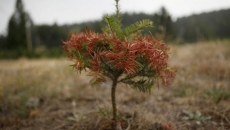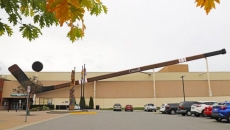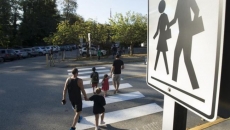Current modelling shows water from a vast lake forming behind a landslide that has dammed the Chilcotin River is more likely to go over the top than burst through in a sudden release, British Columbia's minister of emergency management said Friday.
Bowinn Ma said the impacts downstream could still be significant depending on the distribution of the overtopping flow, and people along the Chilcotin and the connecting Fraser River may need to leave the area on short notice.
"We continue to plan for worst case scenarios," she said.
The minister said there's no timeline on when the water will start flowing, and "current modelling" shows that overtopping of the dam is more likely than a sudden break.
⚠️ A large landslide along the Chilcotin River has resulted in a complete blockage of the river. Breakthrough of backed up water is possible and could pose significant risk to people and infrastructure downstream. Immediately exit and stay away per the @EmergencyInfoBC alert. 👇 https://t.co/SxMGwh3PDO
— Bowinn Ma (@BowinnMa) August 1, 2024
They estimate it will take 12 to 24 hours for water and debris from the dam to reach Hope, B.C., about 500 kilometres south of the massive landslide.
They estimate it will take 12 to 24 hours for water and debris from the dam to reach Hope, B.C., about 500 kilometres south of the massive landslide.
"There will be time to alert people at risk along the way if they must evacuate," she said.
Chief Joe Alphonse of the Tsilhqot'in First Nation said Friday that there's not a lot that can be done other than "sit and wait" for the landslide to clear.
Alphonse said a slide that dammed the river two decades ago burst in about four days, but this latest slide is "a lot larger than it was last time."
"This is not really anything new for us," he said. "There's not a lot we can do."
Alphonse said there's not much use in worrying about what may happen, other than hoping people don't get too close to the water should it rapidly rise after the debris clears.
The slide came down early Wednesday, blocking the Chilcotin, which is a tributary of the Fraser River that flows all the way down to Metro Vancouver into the ocean. The Chilcotin is also part of Canada's largest sockeye run.
Alphonse said a salmon run expected late next week has already likely been affected and "that run is now in jeopardy and that's very concerning for us."
"We should have a fishery going on right now," he said. "We are dependent on salmon runs for healthy living. That's the main source of food for our people."
Chief Francis Laceese of the Tl'esqox First Nation, part of the Tsilhqot'in government, said in a video posted to social media that "our salmon are the strongest that come up the Fraser River."
"They're born at the highest altitude, the coldest water. So, that makes them a strong, strong species," he said.
He said slides in the past have seen the river eventually go back to normal and the fish that use the Chilcotin "have to go through a lot to make it back in the four-year life cycle," including surviving sport and commercial fisheries on their way back to their spawning grounds.
For Chief Willie Sellars of the Williams Lake Indian Band, the uncertainty of how the landslide will give way is a key concern.
Sellars flew over the slide in a helicopter two days in a row and said the water behind the dam doubled in size from Wednesday to Thursday and it continues to build.
"And it's eventually going to get to this place where it starts overtopping the slide. And, you know, all the experts in all the calls and the feedback that we continue to hear is, is nobody really knows what is going to happen."
The scenarios set out for the dam include it releasing all at once, or the water could trickle through, or the lake behind the dam will top the slide and allow the river flow to resume, he said.
"But there is this massive body of water that is building on the one side of that slide. And it's scary," he said.
"It's hard to describe in words how massive this slide is, and how devastating it is."
Connie Chapman with the B.C. government's water management branch said the lake behind the dam has grown to 11 kilometres long, and a new estimate of the size of the blockage is about 1,000 metres long, 600 metres wide and 30 metres deep.
Chapman said the debris includes burned material from past wildfires, fine silt, clays and glacial sediment, which she said is "more susceptible to erosion and movement than rock within the river."
Water and Land Minister Nathan Cullen said the area has been hit with landslides in the past in 2004 and in 1964, both of which broke up naturally.
He said there are concerns about impending salmon runs expected in the next one to two weeks, but reports about the slides in the past indicate that the fish are "incredibly adaptable species, particularly to these natural occurring events."
He said warm water is also a concern for the salmon, and they are working with federal fisheries officials and First Nations on ways they can help fish in case of any blockages.
"We're paying very, very close attention to not only stream flow, but also temperatures," Cullen said.
Ma said it's "imperative" for people along the river and downstream from the slide to have a go-bag ready in case of an evacuation, but officials are hopeful it doesn't come to that.
"The best case scenario is that nature runs its course in a soft and gentle manner and naturally clears the blockage, and that this is done in a slow enough way that debris does not carry itself down the river and create more erosion along the way," she said.
One man camping along the river was awoken by the slide and ran for his life. He was rescued by search and rescue crews and later treated for a broken leg, but his dog disappeared.
A statement from the Cariboo Regional District on Friday said that the dog, named Seko, has been found and is in the process of being reunited with its family.






